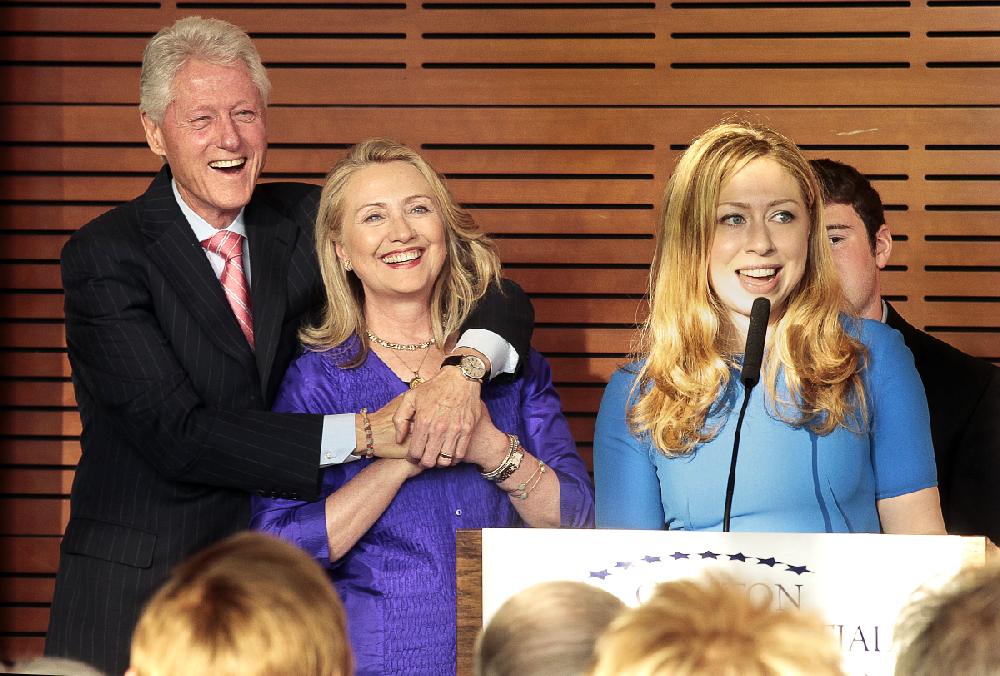WASHINGTON - Thousands of Clinton-era documents released Friday show an administration weighing the growth of international terrorism, how to handle the 1994 Republican wave and what to say after George W. Bush’s election.

Clintons
The release of about 4,000 pages is the second by the National Archives and Records Administration in two weeks. The agency released about 4,000 pages Feb. 28.
Under the Presidential Records Act of 1978, presidents can seal these records for 12 years after they leave office; Clinton’s last day in office was Jan. 20, 2001.
In February, Politico reported that 33,000 pages of records had not been made public in January 2013 when that restriction on their release expired.
Many of the records detail advice given to then-President Bill Clinton and first lady Hillary Rodham Clintonby top aides. The documents are available online at http://clintonlibrary.gov/formerlywithhelddocuments.html.
The papers are separated by topic into 55 groups on the website, such as genocide in Rwanda; Catholics; disability rights; records related to the assassination of President John F. Kennedy; and the transition to the Bush administration. Many of the documents show handwritten editing of the president’s speeches.
Many of the documents show an administration struggling with how to respond to increasing terrorist attacks, particularly the 1996 attack on the Khobar Towers in Saudi Arabia that killed 19 U.S. servicemen.
Aides discussed the political ramifications of another bombing.
“Terrorism against U.S. military forces in Saudi Arabia is unlikely to ever prevent us from fulfilling our military missions in the region,” an undated memorandum by aide Will Wechsler states. “At some point, however, losses from a series of terrorist attacks will begin to be considered politically unacceptable,” writes Wechsler, who is now a deputy assistant secretary of defense in a division for special operations and combating terrorism.
National-security staff member Steven Simon questions in a September 1996 email, “What are the options for dealing with failed states, like Afghanistan, that provide a home for such [terrorist] groups?”
Efforts were made to reassure the public.
“I would say that it is safe to fly,” Secretary of Transportation Federico Pena wrote in a 1995 note about efforts to step up airport security in the face of terrorist threats.
The initiative came after authorities uncovered a plot earlier that year to blow up 11 U.S. jumbo jets over the Pacific in a single day.
The memorandum, sent to White House Chief of Staff Leon Panetta, states, “While I would acknowledge no specific threat to civil aviation exists, I would say law enforcement and intelligence information, which I cannot discuss, provides the basis for our actions.”
Pena wrote that the Air Transport Association, an aviation lobbying group, worried how the public would react to the increased security.
An unsigned handwritten note regarding the 1995 directive states ,“send a Muslim!” to speak on behalf of the federal government.” This effort will get us to the real issue ‘terrorism’ vs a perceived issue of religion. (Muslims against US and vice versa.)”
Hundreds of the documents look at the 2000 election of George W. Bush over Vice President Al Gore and include internal wrangling over how to set the right tone after the Supreme Court ruled in Bush’s favor, resolving the dispute over who had won.
In one draft of a Dec. 14,2000, speech Clinton gave about the decision, a speechwriter suggested commending Gore on his strong campaign instead of congratulating him. A series of emails shows editing to the speech in the hours before it was given as advisers tried to craft a speech that encouraged the country to accept the result but also pointed to procedural voting problems.
Included in the documents are 89 pages on former Arkansas Lt. Gov. Bill Halter, who held several jobs in the Clinton administration. Many of those records detail Halter’s schedule as deputy Social Security commissioner, or are emails on which he is copied.
A February 1999 email from David Beier, an adviser to the vice president, talked about hiring Halter to work in Gore’s office.
“I think one of Bill’s many pluses is that he has the good sense not to unleash an onslaught of people to push this in his direction, although he clearly could,” it states.
Thurgood Marshall Jr., who was working for the administration at the time, responded that there were “financial, legal and other impediments that we will need to review” about the idea.
A lengthy back and forth over where in the administration to place Halter took place in 1999.
One email states that the counsel’s office has received documents necessary to do a background check on Halter, “but they have said they will not move on his clearance until they know of the position [he would fill.] Mr. Halter has been calling them frequently to inquire about his status.”
Other interesting items in the records include:
In a draft of his 1993 speech to the Gridiron Club, Bill Clinton joked about his wife’s role in the White House. At the time, Hillary Clinton was lobbying for her health-care plan.
“Hillary is doing a great job with the health care task force, but the Republicans say she’s not up to the job. I guess they wonder how she can improve the health of 250 million Americans when she can’t get me to give up egg mcmuffins,” he said.
In June 1999 when Russian President Boris Yeltsin unexpectedly gave Clinton 80 documents related to Lee Harvey Oswald and the Kennedy assassination when the two were at a Group of Eight meeting in Germany, National Security Council director Stuart Kaufman wrote to staff member William Leary concerned that the files could have been doctored.
“Even worse than their probably having removed information that makes them look bad is the possibility that they might have inserted some disinformation to try to embarrass [the United States.] Some of the Russian intel folks are unreconstructed Cold Warriors. We’ll have to think about how to handle that,” Kaufman wrote.
White House aides discussed giving astronomer Carl Sagan the Presidential Medal of Freedom in 1997, the year after he died. The aides also bemoaned the difficulty in finding worthy, living candidates.
“Another good dead person is [photographer] Ansel Adams,” aide Shelley Fidler wrote. “We’re having trouble thinking up great living people. I guess that’s everyone’s affliction these days.”
In a 1995 memorandum about the State of the Union address, adviser Paul Begala questioned whether the president should be self-deprecating about losing the House and Senate to Republicans in the 1994 election.
“I really don’t like the President making fun of our ass-whipping in November, or suggesting it was because of him we got creamed. I hasten to add that James disagrees: he thinks it’ll be effective self-deprecation; I’m concerned it could look like a white flag of surrender,” Begala wrote.
The note does not identify who James is.
Concerns that Clinton’s message was getting lost in the wake of that midterm election appear in the records repeatedly.
“It’s astonishing how much we’ve done,” Clinton said in a private Oval Office meeting in 1994. “But we lose the story line, and we don’t have anybody else out there helping us with it… we’ve got to figure out how to reestablish it with real energy.”
Adviser Michael Waldman wrote in December 1994 that Democrats had walked into a GOP trap when they refused to compromise on a stimulus plan “larding it with pork.”
“We need to set a trap of our own and wait for them to walk into it (or lure them into it),” he wrote.
The White House needed a strategy “on how to paint the GOP as the party of wealthy special interests,” he wrote.
Information for this article was contributed by Lisa Hammersly of the Arkansas Democrat-Gazette.
Front Section, Pages 1 on 03/15/2014

